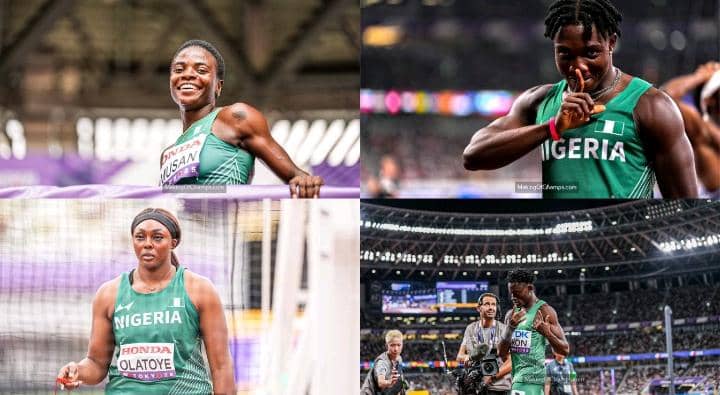Boluwatife Kehinde
Nigeria finished 27th on the medal table at the World Athletics Championships in Tokyo, ending the competition with one silver medal as the event set new records for global participation and reach.
The country’s sole medal came from Tobi Amusan, who won silver in the women’s 100m hurdles to continue her consistency as Nigeria’s most reliable international performer.
Ezekiel Nathaniel also joined her on the podium, breaking his own national record in the men’s 400m hurdles by clocking 47.11s to finish fourth in a dramatic race that initially promoted him to third after the disqualification of Rai Benjamin.
Kanyinsola Ajayi added to the positives by reaching the men’s 100m final, where he placed sixth. Udodi Onwuzurike advanced to the men’s 200m semi-final, while Chukwuebuka Enekwechi impressed with a fifth-place finish in the men’s long jump.
Other members of the 15-athlete delegation fell short of progressing beyond the early stages. Rosemary Chukwuma exited in the women’s 100m heats, Israel Okon fell in the men’s 100m semi-final after winning his heat, and both Chidi Okezie and Samuel Ogazi did not advance in the men’s 400m.
In the field, Chioma Onyekwere-Lyons and Obiageri Amaechi were eliminated in the women’s discus first round groupings, Sade Olatoye failed to progress in the hammer, and Prestina Ochonogor and Ese Brume bowed out in the women’s long jump. Charles Godfred also missed out in the men’s long jump.
Nigeria’s single silver placed it in joint 27th position alongside 12 other countries, including Algeria, Greece, Ireland, Morocco and Poland.
The United States dominated the standings with 16 golds and 26 medals overall, while Kenya, Canada, the Netherlands and Botswana rounded out the top five. A record 53 nations made it to the medal table, surpassing the previous mark of 46 achieved at Budapest 2023 and Osaka 2007.
The championships witnessed one world record, nine championship records and nine area records, with Sweden’s Mondo Duplantis setting the standout mark by raising the pole vault world record to 6.30m.
Historic first medals were won by Samoa, Saint Lucia and Uruguay, while Tanzania celebrated its first ever world gold. US sprinter Melissa Jefferson-Wooden claimed a treble in the 100m, 200m and 4x100m relay, while Beatrice Chebet of Kenya and Maria Perez of Spain won double golds.
Sydney McLaughlin-Levrone stormed to the women’s 400m title in 47.78s, the second-fastest time in history, and Canada’s Ethan Katzberg threw 84.70m to set a championship record in the hammer.
World Athletics hailed the event as the most impactful edition in history, with more than 619,000 fans in attendance, surpassing the Tokyo 1991 tally. Television audiences reached record highs, including over 12 million viewers in Japan on the opening day and 75% of Sweden’s TV audience tuning in to watch Duplantis’ record-breaking performance.
The governing body also confirmed that its social media platforms attracted 700 million video views, while more than 125,000 articles were published worldwide with a potential reach of 180 billion.
World Athletics President Sebastian Coe described Tokyo 2025 as “a championships for the ages”, thanking the host city for delivering on its promise of full and noisy stadiums after the silence of the pandemic-hit Tokyo Olympics in 2021.
Local organising committee president Mitsugi Ogata echoed the sentiment, saying the event lived up to its slogan “Every second, SUGOI” and reached new audiences globally.
In all, 1992 athletes from 193 countries and the Athlete Refugee Team competed across nine days of action, with 20 nations winning gold medals and 74 making the top-eight rankings.



